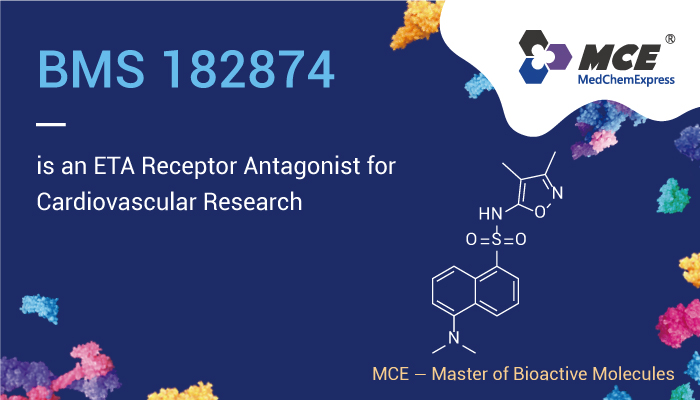Endothelin receptors are G protein-coupled receptors (GPCRs) of the β-group of rhodopsin receptors that bind to endothelin ligands. In addition, there are at least four types known, ETA, ETB (ETB1, ETB2), and ETC. Moreover, Endothelins exist in several tissues, including the vascular endothelium (ET-1 exclusively) and smooth muscle cells. Released endothelin binds to the endothelin receptors ETA and ETB, the ETA receptors on vascular smooth muscle cells mediating vasoconstriction, and the ETB receptors on the endothelium linked to nitric oxide (NO) and prostacyclin release.

BMS 182874 is an ETA receptor antagonist for cardiovascular research.
BMS 182874 is an orally active, highly selective endothelin receptor (ETA receptor) antagonist, with an IC50 value of 0.150 μM, Ki of 0.055 μM. It reduces the arterial pressure of the Deoxycorticosterone acetate-induced hypertension model in rats. And it can play a role in cardiovascular disease research.
In some in vitro experiments, BMS-182874 is an antagonist of the ETA , with an IC50 value of 0.150 μM and Ki of 0.055 μM in vsm-A10 cells, and with a Kb value of 0.520 μM in rabbit carotid artery ring. In some in vivo experiments, BMS 182874 (100 μM/kg, p.o.; a single oral) makes arterial pressure slowly fall by 25% from a control level. Importantly, after dosing for 12 and 24 h makes arterial pressure is still 12% below the control level.
In conclusion, BMS 182874 is an orally effective and highly selective endothelin receptor ETA antagonist. Besides, it can reduce arterial pressure in a rat model of hypertension and can play roles in cardiovascular disease research.
Reference:
[1] Mohd Abdullaha, et al. ACS Omega. 2023 May 9;8(20):17591-17608.
[2] K Barnes, et al. Neurochem Res. 1997 Aug;22(8):1033-40.